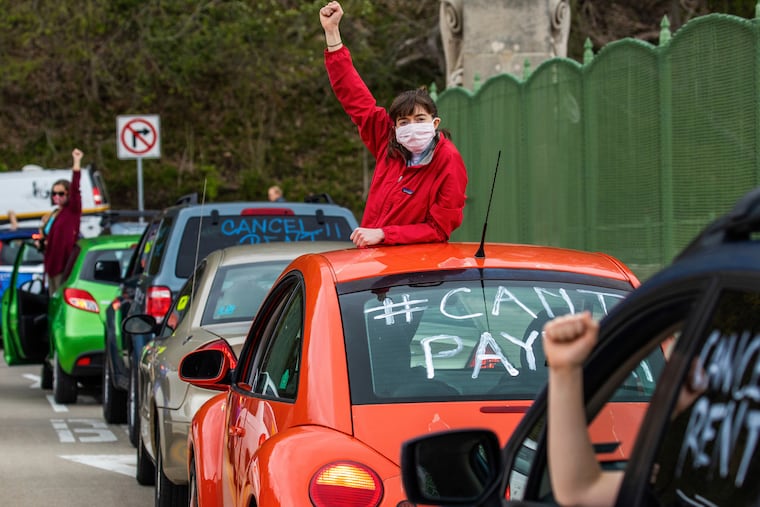Advocates, officials try to prevent Philly’s coming wave of coronavirus evictions
Proposals include extending the eviction moratorium, establishing an eviction diversion program, providing financial counseling for renters, and freezing rent.

As the coronavirus pandemic continues and Philadelphia courts stay closed through at least the end of May, legal evictions of renters in the city are on hold. That includes 1,700 evictions that had been scheduled and thousands more that landlords are waiting to file.
Once courts reopen, housing advocates predict “an avalanche of evictions” if city officials don’t act.
Typically, about 1,500 evictions are scheduled each month in Philadelphia, where almost half of residents are renters. Many more tenants are now in danger of losing their homes as the pandemic costs them their jobs.
“If we let this unfold without putting in place any protections ... we’re setting ourselves up for mass evictions, for mass reinfection, and a second wave of this virus, and the need to shut down our economy again here in Philadelphia,” said Rachel Garland, managing attorney of the housing unit at Community Legal Services of Philadelphia.
Housing advocates and city officials are considering how best to help tenants while the city faces its own income losses.
Policy recommendations include tenant access to legal resources and financial counseling, an eviction diversion program modeled off the city’s successful foreclosure prevention program, and stipulations that, if the city provides rental assistance, evictions be resolved in a way that protects tenants’ ability to find new housing. Those ideas come from the Reinvestment Fund, a Philadelphia-based redevelopment nonprofit, that released a report last week based on conversations with tenants, landlords, and their attorneys, and the review of more than 2,000 agreements between landlords and tenants.
» READ MORE: In one chaotic courtroom, free counselors and attorneys have saved 11,000 Philly homes from foreclosure
Landlords typically seek to evict more than 20,000 Philadelphia households each year.
“We know once court reopens, there’s going to be an unprecedented number of [eviction] filings,” said Emily Dowdall, policy director at the Reinvestment Fund. ”We see many of our recommendations as upfront investments that will save the city money down the road.”
The recommendations, the report’s authors said, “are intended to help manage the increased caseload following the COVID-19 court closure, ensure that the process is fair, and promote stable tenancy that is beneficial to both landlords and tenants.”
An eviction diversion program, which would bring together landlords and tenants for mediation before formal evictions, is one proposal in a package of housing protection bills City Councilmembers introduced Friday. Other ideas include extending the eviction moratorium, waiving late fees for rent, extending repayment plans, and limiting rent increases.
» READ MORE: Some tenants are calling for a Philly-wide rent strike on May 1. Landlords are holding their breath.
At a news conference last week, Councilmember Kendra Brooks called the proposals “humane protections to keep people in their homes during this unprecedented public health crisis.”
Garland noted that these are measures “that frankly most good landlords are doing.” But others, she said, are illegally locking out tenants, charging “exorbitant” late fees, and threatening to call U.S. Immigration and Customs Enforcement.
The Reinvestment Fund report also highlights the importance of legal representation for both tenants and landlords and finds better outcomes for both parties when all know their rights and responsibilities. In line with most legal proceedings, tenants who bring lawyers to eviction negotiations tend to get better deals, including being allowed to leave a unit without owing more money or entering an installment plan instead of owing a lump sum.
But nearly two in three tenants do not have an attorney when entering into agreements with landlords without a judge’s participation.
The report reaffirmed what attorneys at Community Legal Services see in courtrooms every day, Garland said.
“Many, many tenants are approaching the eviction process with very little information” about how it works and how to advocate for themselves, Garland said.
The city is working to implement its plan to provide free legal representation to low-income tenants, following a bill City Council passed in the fall.
» READ MORE: Philly Council passes Right to Counsel, giving free legal representation to tenants who are evicted
The Philadelphia Eviction Prevention Project, created in 2017, provides tenants with information and legal help. But like many other city programs, its funding is in jeopardy as officials figure out how to close a budget hole of roughly $649 million due to financial losses caused by the pandemic.
The Philadelphia Inquirer is one of more than 20 news organizations producing Broke in Philly, a collaborative reporting project on solutions to poverty and the city’s push toward economic justice. See all of our reporting at brokeinphilly.org.